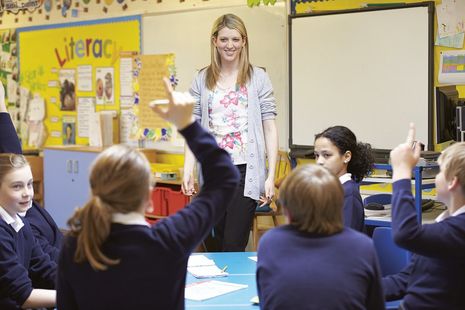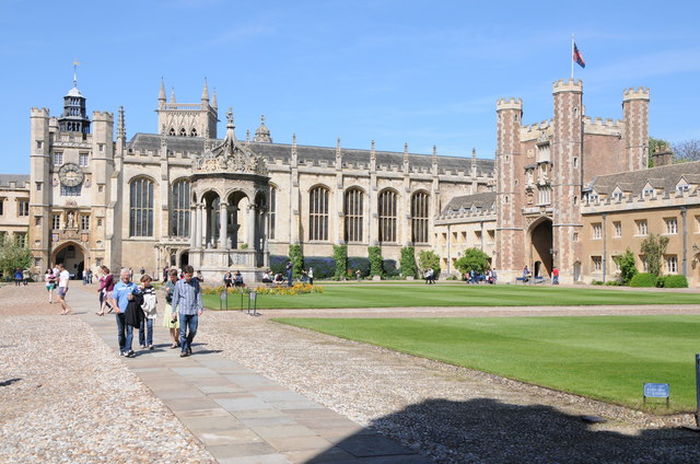Hands up! Who wants to go into teaching? Here’s why you should choose the state sector
Reflecting on her experiences of teaching after graduating, Ruby Woolfe makes the case for teaching in the state system.

Once I had graduated from Cambridge I was determined to find a career working with young people. After a brief period tutoring A level students , and a year in the school charity sector, last Autumn I began my inaugural term as a Teach First trainee English teacher at a state school in Southall.
Now more than ever, there is a vital need for people with academic rigour and dedication to work in the education system, and at first glance it seems they are enrolling. In 2017, the most popular career choice for Oxford graduates was teaching, with the more lucrative alternatives of investment banking and consultancy attracting half as many. However, data implies that these new educators are favouring the private sector. In 2015, 17% of teachers in the independent system were Oxbridge graduates, compared to just 5% in state schools. And for those working in areas of hot demand such as STEM subjects like Science and Maths, the gap is even starker.
Peering beyond the horizons of vicious self interest, independent schools are harmful to national income and economic growth. It is well known that societies with more equal distribution of incomes such as Japan and Finland, have better health, fewer social problems such as violence, drug abuse, teenage births, mental illness and obesity, and are more cohesive than ones in which the wealth gap is greater. Where you are educated remains a key indicator of wealth inequality and a more equal society benefits everyone.
“...such educational separation is socially corrosive and deeply divisive.”
On the face of it, it’s not hard to see why. Who wouldn’t prefer smaller class sizes, more compliant pupils and longer holidays? Private schools have some of the best equipped classrooms and idyllic grounds: you wouldn’t expect less for up to £14,000 a term in fees. Yet such educational separation is socially corrosive and deeply divisive. Motivated and enthusiastic graduates opting to support the already privileged is only further entrenching the profound inequalities in our society.
The “independent” nature of private schools means there is a miraculous lack of information about their pay rates and the qualifications of their staff. However the facts that we do have brutally reflect how increased wealth and resources, such as charitable donations, preferential tax rates, and of course the high fees, are ploughed into private education, in comparison to the meagre annual increases- if we are lucky- for the state system.
Some argue that teaching in a private school provides more time to focus on your subject, but even a tight national curriculum still allows planning of creative lessons, and in-depth knowledge is greatly appreciated by the students. My Latin training often comes in handy when deconstructing the meaning of language, and I regularly find myself referencing classical literary motifs in GCSE Shakespeare lessons. This is not an uncommon occurrence in private education, but it is in the state system.
Jonathan, who completed a Secondary Maths PGCE at Homerton College agrees that there is flexibility within the state sector:’ “A worry I had was that I would find everything completely prescripted. I was wrong. Alongside Maths, I was able to lead cross country and athletics club, as well as helping to organise Y7 camp. These were all things I chose to do rather than being thrust upon me.”
“Building relationships and being appreciated by young people with comparatively limited opportunities can be incredibly heart-warming.”
Discipline in the state sector can at first seem more challenging, but learning how to make lessons as engaging and “distraction-proof” as possible will quickly improve your practice. Building relationships and being appreciated by young people with comparatively limited opportunities can be incredibly heart-warming. The highlight of my first term was receiving an email from one of my year 8 students to whom I had recommended a number of challenging poems, which ended:“... I have had an amazing term and am a much more confident writer. You have pushed me out of my comfort zone, to think more creatively”.
William Bowers studied Natural Sciences at Trinity College, before doing a Physics PGCE, and has no regrets about opting for teaching in the state sector. “Teaching is a job with endless variety and unpredictability with plenty of funny and rewarding moments. By choosing state schools, you are offering opportunities to everyone in society, not just a narrow few.”
ITT training routes, such as Teach First, provide you with a full salary in your training year. Rachel Longstaff, having studied a degree in Law at Magdalene College, swapped the Bar for Secondary Maths on the Teach First scheme. “I thoroughly enjoyed the practical nature of training on the job, and I think Teach First suits the intense nature of most Oxbridge students. To have a career with such a transformative real life impact has been deeply rewarding.”
PGCE options can also provide bursaries and scholarships of up to £26,000 in shortage subjects such as Maths, Physics, Computing or Chemistry. As a newly qualified teacher, after your first year of training, you’ll begin on a pretty reasonable salary of at least £25,700, or £32,200 in inner London. There are many opportunities for promotion and extra responsibility in the state sector, and the best and most committed can rise swiftly up the pay scale. A headteacher in Inner London can earn as much as £125,000 per year.
If you want a worthwhile pastime that provides endless hilarity and priceless moments of intoxicating charm, get into teaching. But only by choosing the state sector will you make our national school system, and the society you live in, the very best it can be.
 Comment / Plastic pubs: the problem with Cambridge alehouses 5 January 2026
Comment / Plastic pubs: the problem with Cambridge alehouses 5 January 2026 News / Cambridge businesses concerned infrastructure delays will hurt growth5 January 2026
News / Cambridge businesses concerned infrastructure delays will hurt growth5 January 2026 News / Cambridge academics stand out in King’s 2026 Honours List2 January 2026
News / Cambridge academics stand out in King’s 2026 Honours List2 January 2026 News / AstraZeneca sues for £32 million over faulty construction at Cambridge Campus31 December 2025
News / AstraZeneca sues for £32 million over faulty construction at Cambridge Campus31 December 2025 Interviews / You don’t need to peak at Cambridge, says Robin Harding31 December 2025
Interviews / You don’t need to peak at Cambridge, says Robin Harding31 December 2025










